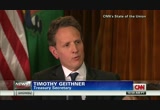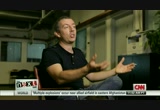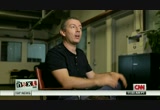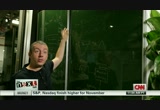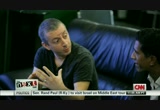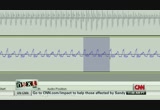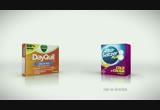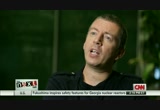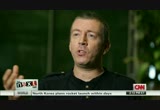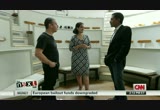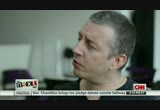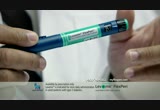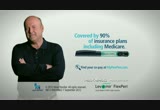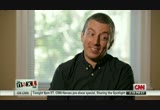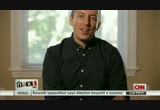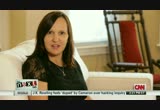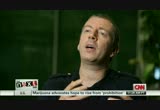tv The Next List CNN December 2, 2012 11:00am-11:30am PST
11:00 am
effect unless congress and the president reach a deal. both sides are digging in. >> if they are going to force higher rates on virtually all americans because they're unwilling to let tax rates go up on 2% of americans, then that's a choice we're going to have to make. >> house speaker john boehner suggested democrats are playing politics. >> this isn't an issue about democrats or republicans. my goodness, this is our country. coming up at 2:30, shock and horror after a deadly bow and arrow attack at a wyoming college. we'll tell what you led up to this tragedy. the next list with sanjay gupta starts right now. they're innovators, game changers, people pushing themselves, moving us all forward. they're the next scientists, musicians, poets, the next makers, dreamers, teachers, and geniuses. they are "the next list."
11:01 am
>> max little has a bold idea. what if doctors could detect parkinson's disease simply by the sound of your voice? max little is close to proving just that. he says one simple voice test can determine if someone has parkinson's. all you need is a telephone. >> we've got an ultra low cost way of detecting the disease. >> he calls it the parkinson's voice initiative. he's testing voices from around the world to fine-tune his algorithm. he's collected over 17,000 voices and counting. how confident can you be that person has parkinson's? >> 99%. >> that's pretty incredible. >> now if he succeeds, he could change the game for parkinson's patients and for doctors. what makes this discovery even more incredible, max isn't a doctor. he's a mathematician.
11:02 am
i'm dr. sanjay gupta and this is "the next list." my name is max little, and for a living i do applied mathematics. >> how do you go from your background in mathematics to essenti essentially coming up with a way to diagnose parkinson's? >> it's an interesting story because in 2006 i was working on techniques for understand iing,o say somebody would have had a full surgery and you want to know has the surgery improved their vocal function or not? it didn't occur to me at the time that neurological disorders such as parkinson's disease also affect the voice.
11:03 am
i think i just thought about it as everyone else does at that point which is you just see tremor in the limbs and that is pretty much how you detect it. and until i had a chance encounter with a researcher from intel corporation and a conference in 2006. he said, well, we've been doing this trial recording voices of patients so perhaps your techniques could be useful there. >> wow. it was a chance encounter? >> totally, yeah. and the reason why they were doing this is because one of the co-founders of intel corporation, andy grove, was diagnosed with parkinson's in 2000. and he realized, as i came to realize later, that there were no objective ways of measuring the progression of the disease. the only way you could do it was by going to a neurologist and having a full exam. and so we met up and he said, so we've got all these recordings of parkinson's disease. do you think the techniques you're using could be used here? i had no idea.
11:04 am
you know, i've never looked to parkinson's disease before. i thought, let's give it a go. let's try it out. >> hello, welcome to the parkinson's. >> so just in terms of the process, if someone picks up the phone and calls, what are they told to do? >> so we have set up a study group, parkinson's voice initiative and the idea of the study is to collect enough data that we can test this technology outside the lab to collect recordings from people in all sorts of circumstances that we can't control. it will then test our ability to accurately detect whether they have parkinson's disease or not. in lab based studies we get 99.9% detect. can we get that accuracy over the telephone when we don't have those control circumstances? >> 99%, though. >> yeah, that's the overall accuracy. so this here, these two formulas, describe typical
11:05 am
algorithms used in clinical voice analysis. so these kind of algorithms are the sorts of things we use to extract useful features from your voice recording. so in this case what will happen is that people will call in. they simply say whether or not they've been diagnosed with parkinson's and we ask them to say aah for as long as they can. >> that's it? >> yeah. >> it sounds so remarkably simple. as a neuroscientist myself, you know, we spend years studying this sort of thing. to think that literally it involves some guy saying aah into a phone or microphone, that could tell you so much information. >> yeah. i mean, bear in mind voices are a very, very rich information source. think of it this way -- there are 44,000 or so samples per second captured with this, these recordings, so there's a lot of data you collect over, say, 30 seconds.
11:06 am
so now think about how a typical health record, how small that is by comparison. >> can we listen to what that sounds like? >> sure, yeah. >> aah. >> so what did you hear there? >> that's a classic example of vocal tremor. you can hear the tremor in the way the vocal folds, the muscles are twitching somewhat. and that affects the pitch. >> so the same sort of tremor that you have in your hands, your arms, you're saying that's basically happening in the muscles around your vocal chords? >> right. >> when you look at that, how do you analyze the data? >> what we're looking at in this case would be the consistency of the interval between each vocal cycle. so in this case if you look at a healthy voice you can see this quite stable interval in between each vocal cycle. whereas if you look at someone who has parkinson's and has vocal tremor, an example where
11:07 am
the interval becomes quite large. >> would that be something that this person would have noticed themselves? >> this example of a tremor is probably fairly obvious to most people who would listen to it and all sorts of things can affect the voice such as smoking or you might have some kind of functional trauma to your local folds, say. we don't only look for vocal tremor. we look for lots of other symptoms. we look for about 130 or so different -- >> is that right? >> yes, that's right. >> a lot of doctors say, look, in the end, you have to lay your hands on the patient. you have to see them with your own eyes. you have to do all that. that's just how doctors diagnose patients. what do you say to those doctors? like a lot of things,
11:08 am
trying to find a better job can be frustrating. so at university of phoenix we're working with a growing list of almost two thousand corporate partners - companies like microsoft, american red cross and adobe - to create options for you. not only that, we're using what we learn from these partners to shape our curriculum, so that when you find the job you want you'll be a perfect fit. let's get to work. ♪ you can stay in and like something... ♪ [ car alarm deactivates ] ♪ ...or you can get out there with your family and actually like something. ♪ the lexus december to remember sales event is on, offering some of our best values of the year. this is the pursuit of perfection.
11:09 am
but they have to use special care in keeping the denture clean. dentures are very different to real teeth. they're about 10 times softer and may have surface pores where bacteria can multiply. polident is designed to clean dentures daily. its unique micro-clean formula kills 99.9% of odor causing bacteria and helps dissolve stains, cleaning in a better way than brushing with toothpaste. that's why i recommend using polident. [ male announcer ] polident. cleaner, fresher, brighter every day. hurry in and try five succulent entrees, like our tender snow crab paired with savory garlic shrimp. just $12.99. come into red lobster and sea food differently. and introducing 7 lunch choices for just $7.99. i have a cold... i took dayquil, but i still have a runny nose. [ male announcer ] truth is, dayquil doesn't work on runny noses. what? [ male announcer ] it doesn't have an antihistamine. really? [ male announcer ] really. alka-seltzer plus cold and cough fights your worst cold symptoms, plus has a fast acting antihistamine
11:10 am
to relieve your runny nose. [ sighs ] thank you! [ male announcer ] you're welcome. that's the cold truth! [ male announcer ] alka-seltzer plus. ♪ oh what a relief it is! ♪ [ male announcer ] can't find theraflu? try alka-seltzer plus for fast, liquid, cold, and flu relief. [ male announcer ] jill and her mouth have lived a great life. but she has some dental issues she's not happy about. so i introduced jill to crest pro-health for life. selected for people over 50. pro-health for life is a toothpaste that defends against tender, inflamed gums, sensitivity and weak enamel. conditions people over 50 experience. crest pro-health for life. so jill can keep living the good life. crest. life opens up when you do. an example future use of this technology could be that a
11:11 am
neurologist has a number set up, a person could call in a that number. they leave a voice recording. the algorithms would analyze the voice recording and the neurologist can get an indication whether they have parkinson's and of course they could get back to the patient and follow up. >> a lot of doctors say, look, in the end, you have to lay your hands on the patient. you have to see them with your own eyes. you have to do all that. that's just how doctors diagnose patients. what do you say to those doctors? >> well, i say, of course, do that. it's very important to do that, but don't forget what's happening on the outside of the body is only one part of what happens in disease. we take a disease like parkinson's, you can do something about it. they can improve the quality of life and suffering. so it's very important to extend the reach of neurologists so that they can do this kind of detection and diagnosis remotely. >> i'm a clinician.
11:12 am
i see patients with parkinson's disease and disorders, i also practice did -- >> how important is it to be diagnosed early with parkinson's? >> if you are having symptoms that are reflecting your day-to-day activities it's important to know what's causing them so that you can be appropriately treated. >> the first symptoms came on suddenly. people noticed a significant limp in my walk. and from time to time i would notice that i would have trouble writi writing. >> what did you think it was? >> i didn't know. there was a long process of being diagnosed before i actually got to dr. mejia. >> when you hear about max little's work, somebody calling, actually giving their voice as part of the diagnosis, what do you think of that as a patient? >> i think that's amazing. i think it's an amazing technology. >> there are whole communities who don't have access to a
11:13 am
neurologist. there are places in the first world people take it for granted, of course, that there is a high density to doctors to patients. that's not true across the vast majority of the world. and so in those circumstances, lots of people will actually go about their lives not realizing that these -- they are developing quite severe symptoms to this disease and their families don't know it. >> if i tell you 30, the number is expected to be around 9 million. >> you know parkinson's well. what does max and his technology offer to you? >> one of the mind blowing things when i said let mae call max is if it helps you screen for very low cost and, you know, very easily accessible technology, it would mean a lot, i think, to many patients.
11:14 am
>> so if you two give presentations together or talk to people here at the university about this? >> not yet. >> we're catching you guys at the very beginning. >> we very recently met. you can think the promise was kind of technologists can hold but then the science that has to happen. i think one of the steps ahead is really testing this further in a controlled manner. >> how big did you think this could get, max? >> i think globally. the real value is we've got an ultra low cost way of detecting the disease that's accessible to 75% of the world's population. >> if you could imagine what this all could become, this initiative, what do you foresee? >> when i foresee for this kind of technology is the opportunity to radically reduce toxic health care that we're looking at, i'm hoping what we can do is we can start to radically reduce these
11:15 am
costs, like getting accurate information about how to allocate those resources. >> you're talking about everywhere in the world potentially? >> absolutely. i just had a very intense relationship with the music and sounds since being very young. >> good boy. that's one smart board. what else does it do, reverse gravity? [ laughs ] [ laughs ] [ whooshing ] tell me about it. why am i not going anywhere? you don't believe hard enough. a smarter way to shop around. now that's progressive. call or click today. [ grunting ] that was me... the day i learned i had to start insulin for my type 2 diabetes. me... thinking my only option was the vial and syringe dad used. and me... discovering once-daily levemir® flexpen. flexpen® is prefilled. doesn't need refrigeration for up to 42 days.
11:16 am
no drawing from a vial. dial the exact dose. inject by pushing a button. flexpen® is insulin delivery... my way. levemir® (insulin detemir [rdna origin] injection) is a long-acting insulin used to control high blood sugar in adults and children with diabetes and is not recommended to treat diabetic ketoacidosis. do not use levemir® if you are allergic to any of its ingredients. the most common side effect is low blood sugar, which may cause symptoms such as sweating, shakiness, confusion, and headache. severe low blood sugar can be serious and life threatening. ask your healthcare provider about alcohol use, operating machinery, or driving. other possible side effects include injection site reactions. tell your healthcare provider about all medicines you take and all of your medical conditions. get medical help right away if you experience serious allergic reactions, such as body rash, trouble with breathing, fast heartbeat, or sweating. with flexpen®... say good night to vial and syringe. ask your doctor about levemir® flexpen. covered by 90% of insurance plans, including medicare. find your co-pay at myflexpen.com.
11:18 am
my name is tonya and i'm married to max. we've been married for 17 years. max and i met a long time ago. actually 20 years ago. so we have been together a long time. and we met through some friends, and then he was a student and he asked if he could stay with me while looking for a place to live. he came to stay on my sofa and gradually moved into my bedroom and has never left. >> yeah, i think i probably did
11:19 am
claim i was going to stay on the couch. if she didn't want to get with me -- well, i guess we just found that we had something in common. i'm just very lucky, i guess. >> we live in oxford permanently but we're here in boston for two years because max has a fellowship at m.i.t. and we have two children, zach who is 3 and aaron who is 2 months. >> well, i was born in scotland and then we moved down to the south of england and i grew up really there. >> max's mom, when she talks about him, she says he was quite an independent child. she says that his bedroom, he had a desk, which was a very large desk, and it was always covered in some pieces of electronics and wiring and stuff he was putting together. >> i think when i wrote my first code i was 7 or 8 years old.
11:20 am
i wrote the codes by hand because i didn't have a computer. so i learned the program before i had a computer. i don't think i was particularly interested in mathematics at that time. i only really became interested in mathematics in my early to mid-20s. i just had a very intense relationship with music and sound since being very young. ♪ i played in a band when i was in college. i wasn't very good. i used to write music for television. i used to write music professionally for advertising purposes. i then realized i needed to get a job. and what i discovered there was a very significant niche in computer games and video programs which allowed me to compose music.
11:21 am
it was a bit of an epiphany in a way. i realized that what i was doing, i was creating sound effects with games. and the it techniques that you could use in order to manipulate sound could be modeled. that's when i realized that i was really fascinated by the mathematics involved, that's what got me -- set me on that path. >> max is smart and scary smart is an overused term but he's a very, very smart guy. he sees mathematics in a way that truly is a beautiful mind. >> i was studying in night class and so i did this college degree and got nearly the highest first class result that you could. and i think this was sufficient to impress oxford that i was good enough to do their ph.d. course and to win a scholarship
11:22 am
to do it. >> max is very english in the way he is self-deprecating and humble. so you would never hear him say anything about himself that makes him sound amazingly clever. >> he was at oxford for his ph.d. and he got a welcome trust fellowship to study at m.i.t. in academics terms he's won a gold medal for his stage of things. i would love to have that on my cv. >> i didn't think i would end up down this math, no. i couldn't have foreseen that at the time, i don't think. >> when you imagine the future, what else can we learn from people's voice like this? [ garth ] olaf's small business earns 2% cash back on every purchase, every day! helium delivery. put it on my spark card! [ pop! ] [ garth ] why settle for less? great businesses deserve the most rewards! awesome!!! [ male announcer ] the spark business card from capital one.
11:23 am
choose unlimited rewards with 2% cash back or double miles on every purchase, every day! what's in your wallet? or double miles on every purchase, every day! trying to find a better job can likbe frustrating.gs, so at university of phoenix we're working with a growing list of almost two thousand corporate partners - companies like microsoft, american red cross and adobe - to create options for you. not only that, we're using what we learn from these partners to shape our curriculum, so that when you find the job you want you'll be a perfect fit. let's get to work. i'm going to dream about that steak. i'm going to dream about that tiramisu. what a night, huh? but, um, can the test drive be over now? head back to the dealership? [ male announcer ] it's practically yours. but we still need your signature. volkswagen sign then drive is back. and it's never been easier to get a passat. that's the power of german engineering.
11:24 am
get $0 down, $0 due at signing, $0 deposit, and $0 first month's payment on any new volkswagen. visit vwdealer.com today. i've got a nice long life ahead. big plans. so when i found out medicare doesn't pay all my medical expenses, i got a medicare supplement insurance plan. [ male announcer ] if you're eligible for medicare, you may know it only covers about 80% of your part b medical expenses. the rest is up to you. call and find out about an aarp medicare supplement insurance plan, insured by unitedhealthcare insurance company. like all standardized medicare supplement plans, it could save you thousands in out-of-pocket costs. call now to request your free decision guide. i've been with my doctor for 12 years. now i know i'll be able to stick with him. you'll be able to visit any doctor or hospital that accepts medicare patients. plus, there are no networks, and you never need a referral. see why millions of people have already enrolled in the only medicare supplement insurance plans
11:25 am
endorsed by aarp. don't wait. call now. ♪ ooh baby, can i do for you today? ♪ [ female announcer ] need help keeping your digestive balance? align can help. only align has bifantis, a patented probiotic that naturally helps maintain your digestive balance. try align to help retain a balanced digestive system. try the #1 gastroenterologist recommended probiotic. align. welcome back to "the next list." max little believes his algorithms can some day help doctors. he wants to put the technology in the hands of patients so they
11:26 am
can manage and monitor their own symptoms accurately, and he's doing this with a very creative partnership. >> i first met max when i was doing my post-on. part of my job was to go out and see parkinson's disease patients in their own homes. i went and saw about 80 patients. it took me three years. and max was coming up with a system that could do much of the same stuff immediately in real time using technology. >> we're partnering up with patients like me. what they want to do is they want to bring this technology to the general population. >> what they've been doing over the years is setting up a system whereby people can look at their own systems. people, dedicated people, who have been entering their systems into the system for years. >> one of the tenets we have people want context. they want to know how sick they are. when you get dying thosed with
11:27 am
parkinson's, you are probably told there are meds for it, it's a slow progression. there are things we can do to help. you don't know where you might be in five years or ten years. what we've been trying to do is give people the tools to predict that. say, well, here is how you are and here is how you compare to the rest of the population. >> max has been starting up this really amazing project that is increasingly accurate to measure or diagnose parkinson's disease, and we're looking now to take this to the next level. we'll tell you something about the future of the patient. >> this is an example of one of our patients with parkinson's disease. i use the name judy. she has had parkinson's. you could tell immediately she has stage three because she joined in '08. she has some old data so she was diagnosed here in 2002. how sick she's been over this intervening ten years, so you
11:28 am
can sort of make some predictions about where she might go with the disorder. and what you would see here in collaboration is see another line that was sort of the voice lab, that we would record voice at the same time we started recording her parkinson's and compare how sick she was in her voice and ultimately if max's thing works out effectively it would be the driver or one of the main drivers of the score, how sick someone is with parkinson's disease. >> this sort of high-frequency data about how people's symptoms change over time has not readily been available for this. this is a new frontier in exploring how individuals respond to treatment to different drugs. and the value of this, this has enormous value in clinical practice. for example, a neurologist might want to make a decision about whether or not to terminate a particular treatment or to change to a different drug at some point. now usually what has to happen now is that someone has to remember how their symptoms
11:29 am
changed at the time and of course it's actually very hard. it's hard for people to remember how their symptoms change because they're busy, first off. >> think about a doctor sitting in an office and managing 1,000 people with parkinson's disease. but he doesn't bring everybody in for an appointment every six months or a year. he gets everybody to do max's system every 30 days or 0 days and the only people that he brings in to see are the people that need to come in. that's going to allow 0 us to prioritize those who need it not just an arbitrary thing. but when people are in need of an adjustment to their dosages or meds they're taking. >> when you look at this and imagine the future, what else can we learn from people's voice like this? >> well, i'm really excited about the possibility that there are other disorders that display
96 Views
Uploaded by TV Archive on

 Live Music Archive
Live Music Archive Librivox Free Audio
Librivox Free Audio Metropolitan Museum
Metropolitan Museum Cleveland Museum of Art
Cleveland Museum of Art Internet Arcade
Internet Arcade Console Living Room
Console Living Room Books to Borrow
Books to Borrow Open Library
Open Library TV News
TV News Understanding 9/11
Understanding 9/11